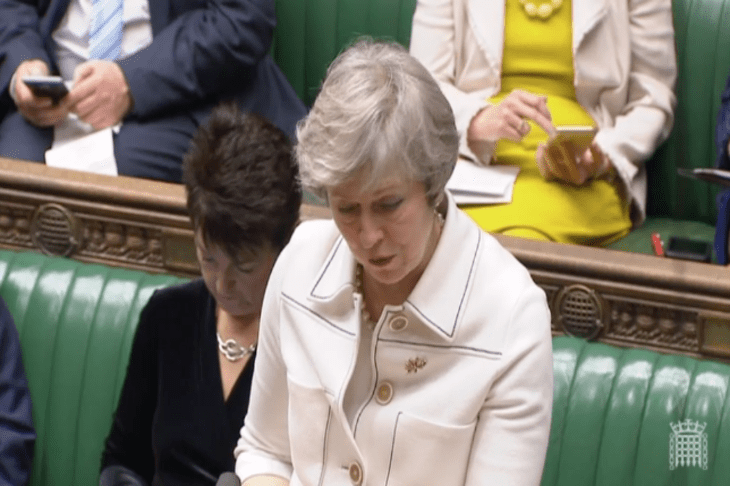If you’re a not particularly impressive leader of a political party preparing a response to any statement given by Theresa May, the easiest phrase that you can lazily reach for is ‘nothing has changed’. You know it will apply to anything the Prime Minister says about how she has improved her Brexit deal.
All three main party leaders appeared to conform to those easy predictions this afternoon. Theresa May stood up and tried to convince MPs that she had secured important changes to the deal that meant they should support it tomorrow. Jeremy Corbyn replied that nothing had changed and that there should be a general election, while Ian Blackford argued that the voices of the people were being ignored and that May should extend Article 50.
There was, though, a change in May’s tone as she addressed MPs. She told them that today’s letter from president Tusk confirmed that the European Council’s assurances that negotiations on the future relationship and work on an alternative that will mean the backstop is not triggered were legally binding. She told the House that Attorney General Geoffrey Cox had written to her today saying that ‘the current draft Withdrawal Agreement now represents the only politically practicable and available means of securing our exit from the European Union’. But as she set out in further detail the commitments made in the letters from Tusk and Juncker, she refrained from praising her deal as being particularly good, instead asking MPs to imagine how very bad a no-deal exit could be. She said:
‘So I say to Members on all sides of this House – whatever you may have previously concluded – over these next 24 hours, give this deal a second look. No it is not perfect. And yes it is a compromise.’
She then made a reference to the questions people would ask as the ‘history books are written’, which drew some laughs from the opposite benches. But May was clearly trying to appeal to those who feel that this might be a moment where an informal movement of national unity could save the day. This is certainly a message that the Whips have been trying on Tory and Labour MPs who they have spoken to, and it’s not without foundation, given the number of people in this debate who seem determined to secure their place in said history books, often over some other MP with whom they have a small rivalry. May’s pitch used to be that no deal was better than a bad deal. But today she very clearly told MPs that her bad deal was better than no deal – and that history would not forgive them for allowing the latter to occur.
Of course, the retort from many of those who have worked with the Prime Minister on Brexit may be that history is already likely to be pretty unforgiving to May for procrastinating so often on so many important decisions regarding the Brexit negotiations, even to the point that she entered them without a clear idea of what she wanted. Indeed, that frustration may well play as much on MPs’ minds as their place in the history books while they weigh up their decision about tomorrow’s vote.







Comments